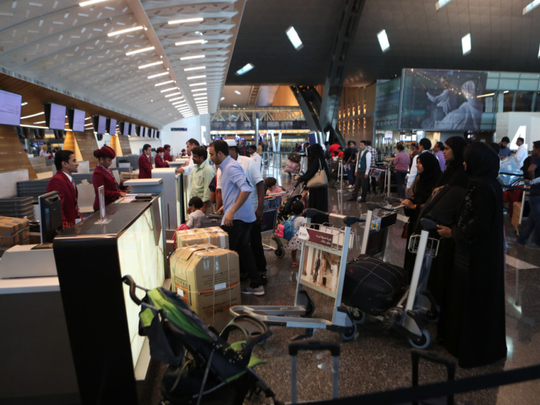
Qatar lost the trust of its neighbours, as time has shown that Doha could not fulfil its political commitments, wrote UAE’s Al Bayan. “Qatar continued to play its conspiratorial role against the Gulf Cooperation Council (GCC) nations, threatening the security and stability of the region. Today, Arab nations are in shock over Doha’s statements. Qatar adopted a policy of double standards, where its actions do not match up to its words. All of Qatar’s calls for dialogue are something that we have seen before, and because the GCC was very keen on the unity of Gulf ranks, they allowed mediators to play their role in resolving the crisis. At present, information shows that Doha has been conspiring against Bahrain, Saudi Arabia and Egypt, that it is involved in Iraq, Syria, Yemen and Libya, while also striving to wreak havoc in other Arab nations. Therefore, it is difficult to believe any of Qatar’s promises in light of its bloodstained legacy,” the newspaper said.
The Qatar boycott stems from the desire of nations to safeguard national security in accordance with legal and international norms, said Saudi Arabia’s Al Yaum. “The magnitude of Qatar’s plots against the GCC and people of the Arab and Islamic world is clear for all to see, just like the contradictions in Qatar’s political practices. This serves the country’s evil goals for spreading sedition, instability and sectarianism in GCC countries and many other nations around the world. Qatar would achieve through its open support for Daesh [the self-proclaimed Islamic State of Iraq and the Levant] and terrorist organisations. This comes at a time when many countries around the world are trying to put a stop to this evil phenomenon in order to preserve stability, security and sovereignty.”
For the past 20 years or more, the member states of the GCC and some Arab countries have been maintaining silence over their agony, concerning the frivolous politics of Qatar, said Kuwait’s Arab Times. “Yet, they always opted for diplomacy and a mild approach towards resolving issues. Throughout that time, Al Jazeera satellite TV channel represented the sword that was being brandished at these countries, especially the GCC. No country was spared from the media accusations and intrigues that it broadcast. This was followed by official Qatari establishments’ politics of interference in the internal affairs of Saudi Arabia, Bahrain, UAE and other Gulf nations. Maybe, we all needed this crisis so that all issues are made clear for all. Now, it will be easy to solve the issues from the core so that no fire will remain under the ashes.”
What Qatar faces today is a boycott of political, social and economic ties, which it won’t be able to withhold, wrote the London-based pan-Arab paper Asharq Al Awsat. “Saudi Arabia, Egypt, Bahrain and the UAE, want Qatar to be held accountable should it insist on adopting a hostile political agenda. Qatar may endure the diplomatic boycott for a few months, keeping in mind that Doha does not share Iran’s tough skin against embargo. In the end, Qatar will succumb and give up on funding anarchist parties. It will eventually shut down most rabble-rousing media outlets it created while evading the commitments it made to the Riyadh agreement. This time, breaking the ice goes beyond a warm opening of arms or a call for traditional Arab tolerance and kindness. Doha needs to seriously rethink its detrimental policy in the region.”




_resources1_16a31069e4e_small.jpg)







